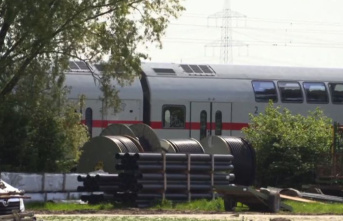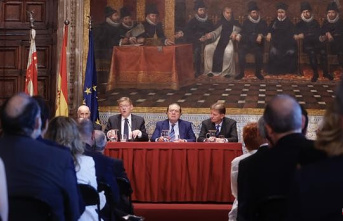LONDON -- A timeline of important events related to Britain’s Prime Minister Boris Johnson
2001-2008: Henley constituency represented in the House of Commons. Johnson served as the Conservative spokesperson on business, innovation, and skills twice during his tenure.
2008-2016: Serves London mayor.
May 7, 2015: Returns of South Ruislip and Uxbridge to the House of Commons
2016: Johnson was co-leader of the campaign for Britain to be taken out of the European Union. Johnson was then in opposition to David Cameron, the former Prime Minister of Britain. Cameron, a Conservative, resigned on June 23rd 2016.
2016-2018: He is the Foreign Secretary and one of the most important members of Prime Minister Theresa May’s Cabinet. Johnson resigned in July 2018 against May's strategy of a soft Brexit that would keep close ties to the EU.
June 7, 2019, Theresa May, Conservative Party leader, resigns after she failed to convince Parliament to support the Brexit deal she negotiated with EU. The party is divided between those who support May and hard-liners led by Johnson who are willing to take on a no-deal exit to secure concessions from EU.
July 23, 2019, Johnson is elected Conservative Party Leader in a vote by party members. The next day Johnson is officially elected prime minister. He inherits a minority government that depends on the votes of Northern Ireland's Democratic Unionist Party for legislation to be passed. Johnson insists that Britain will leave the EU on October 31, with or without a deal.
August 28, 2019, Announcement: He will close Parliament from mid-October to allow opponents more time to stop a no-deal Brexit.
September 3, 2019, 23 rebel Conservative Party lawmakers back legislation that requires the government to extend Brexit negotiations if it cannot reach an agreement with EU. The measure is passed and the rebels are expelled.
September 5, 2019, Johnson: Johnson says he'd rather die in a ditch than ask for an extension from the EU.
September 24, 2019, U.K. Supreme Court declares that the government's suspension o Parliament was illegal.
Oct. 19, 2019: Johnson requests that the EU delay Brexit once more. The new deadline is January 31.
Nov. 6, 2019, Parliament dissolves and early elections are scheduled for mid-December. Johnson is seeking a mandate to implement his Brexit strategy.
Dec. 12, 2019, Johnson wins an 80-seat majority at the general election. This gives him the support he needs to pass Brexit legislation.
Jan. 23, 2020: After approval by the U.K. parliament, the Brexit deal becomes law. Six days later, the European Parliament approves of the agreement.
March 23, 2020: Johnson locks down the United Kingdom due to COVID-19.
April 5, 2020: Johnson was admitted to the hospital and then transferred to intensive care with COVID-19. Johnson was discharged from the hospital on April 12 after he thanked the nurses for being there to keep him breathing throughout the night.
Nov. 3, 2021: Conservative lawmakers are asked by the government to support an amendment to ethics rules in order to delay Johnson supporter Owen Paterson's suspension. Owen Paterson had been censured after he violated lobbying rules. The measure is passed.
Nov. 4, 2021 - Johnson reverses course, allowing lawmakers to vote on Paterson’s suspension. Paterson resigns.
Nov. 30, 2021: British media report allegations that officials of government attended parties at government offices in November and December 2020, in violation COVID-19 lockdown rules. Over the next weeks, more than a dozen parties were reported to be part of the scandal. Johnson claims that there were no parties or rules broken. However, opposition leaders criticize Johnson for ignoring the law and blaming the government for not enforcing it as other people sacrificed their lives to fight the pandemic.
Dec. 8, 2021: Johnson authorizes an investigation into the "Partygate” scandal. The pressure builds to meet a leadership challenge but it fails.
March 23, 2022: The government announces its mid-year spending plan. It is criticised for not doing enough to help those struggling with rising living costs. Rishi Sunak, Treasury chief refuses to delay an income tax hike or impose windfall profits taxes on oil and gas companies that are benefiting from rising prices.
April 9, 2022: Johnson and Volodymyr Zelenskyy, the Ukrainian President, meet in Kyiv to discuss a new package for military and economic support. Johnson and his supporters are encouraged by the move, which helps them to support their argument that the government should focus on the crisis in Ukraine, and other major issues, and not domestic political squabbles.
April 12, 2022: Johnson was fined 50 Pounds ($63) for attending one party. Johnson apologizes. Johnson apologizes to the opposition parties.
May 13, 2022: Unionists block government in Northern Ireland over Brexit trade rules.
May 18, 2022: The Office for National Statistics released data that showed annual inflation rose to 9% in April. This is the highest rate in 40 years. This report calls on the government to take more action to address the cost-of living crisis caused by rising energy prices.
May 22, 2022: The Partygate investigation's findings are published. The report details 16 events that took place at Downing Street, the complex where the prime minister lives and works. It also includes information about other government offices and the home of the prime minister. This report details instances where excessive drinking, property damage, and disrespect for cleaners and security personnel.
May 25, 2022: Johnson claims he was "vindicated” by the Partygate investigation. Johnson spoke to legislators and stated that he attended "briefly" some of the gatherings to express gratitude to departing staff members, but had no knowledge about the excesses that took place after he left.
May 26, 2022: The Government reverses its tax decision regarding oil and gas companies, and announces plans to levy a 25% windfall profit levy.
June 3, 2022: Johnson was booed by the crowd as he walked up St. Paul's Cathedral to attend Queen Elizabeth II's thanksgiving service during celebrations of her Platinum Jubilee. This moment, critics say, is a pivotal one that shows his waning support from the public.
June 6, 2022: Johnson wins confidence votes, but 41% of his party vote against Johnson. This puts Johnson's future leadership in jeopardy.
------------
Rhonda Shafner in New York contributed
----
Follow AP's full coverage of Brexit and British politics at: https://www.apnews.com/Brexit












